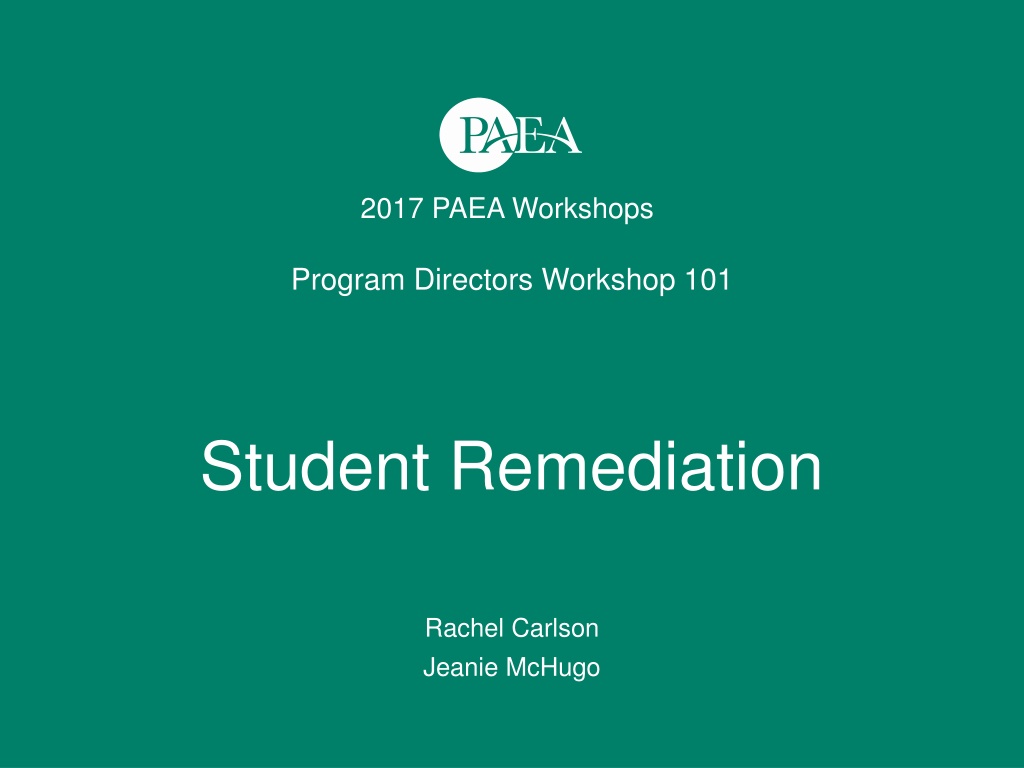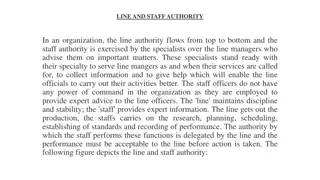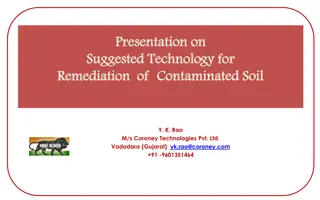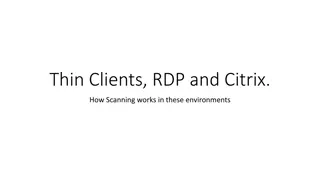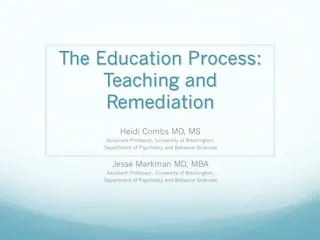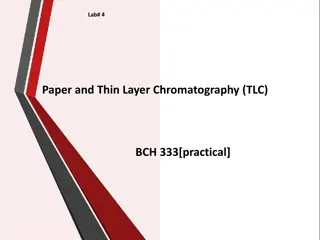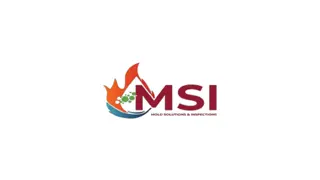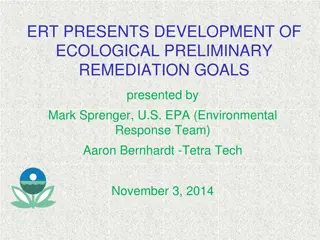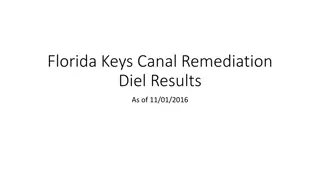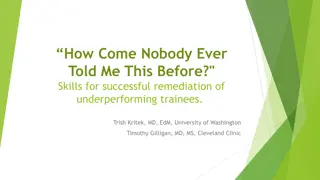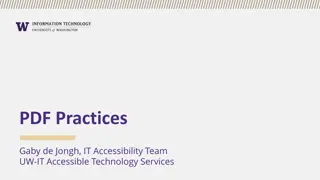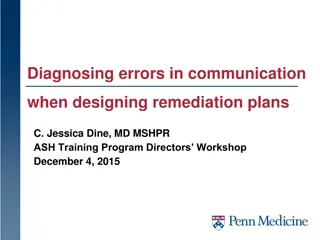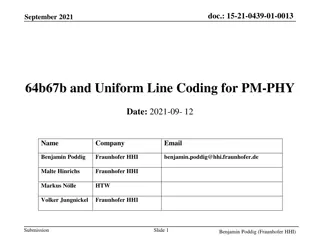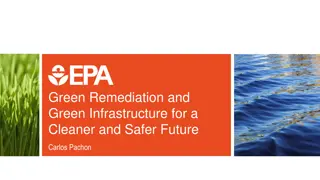Understanding the Thin Line of Remediation in PA Education
Explore the challenges and goals of remediation in physician assistant (PA) education, delving into the importance of addressing deficiencies while avoiding spoon-feeding. Learn how to align institutional principles with remediation strategies to provide second chances for students with diverse needs and backgrounds.
- Remediation
- Physician Assistant Education
- Institutional Principles
- Student Support
- Academic Standards
Download Presentation

Please find below an Image/Link to download the presentation.
The content on the website is provided AS IS for your information and personal use only. It may not be sold, licensed, or shared on other websites without obtaining consent from the author. Download presentation by click this link. If you encounter any issues during the download, it is possible that the publisher has removed the file from their server.
E N D
Presentation Transcript
2017 PAEA Workshops Program Directors Workshop 101 Student Remediation Rachel Carlson Jeanie McHugo
Remediation PA faculty are often challenged to manage the thin line between remediation and spoon feeding . In this session, participants will explore the relationship between institutional missions, principles of pedagogy, and remediation. By the end of this session, learners will be able to: Define remediation Analyze remediation goals Describe how remediation goals relate to PA education and the mission of a program
What ? The act or process of remedying something that is undesirable or deficient. An intervention to avert a potentially poor situation or outcome "Remediation." Thefreedictionary.com, n.d. June. 2015. http://www.thefreedictionary.com/remediation
Why Remediate Pro Con Second opportunity Fast paced curriculum w/ high stakes Vast curricula content Increase access to the profession/ diversity of perspectives Required (?) Other? Perceived as spoon feeding ; creates an unrealistic condition Creates a two-tier system Promotes concept of second chances Unfair/biased Other?
ARC PA Accreditation Standards C3.03 The program must monitor and document the progress of each student in a manner that promptly identifies deficiencies in knowledge or skills and establishes means for remediation.
Guiding Principles Assess institutional principles Decide, in advance If yes, under what conditions If no, state clearly Align policies and procedures with institutional principles (the program is the institution)
Define Remediation Goals Address potential outcome of at risk students Supplement students facing multiple competing demands Supplement those with varied learning and integration capacities
What may be remediated? Didactic exams Expository papers Direct observation and simulation exams Clinical experience/clerkship performance Professionalism ratings
Conditions When might remediation be an option? Assessed performance falls within a defined number of points or percent score, required for passing On one assessment, more than one, any or all? In one, in any course or in all courses In didactic phase, clinical phase or both
For Whom? Remediation is not an ADA accommodation If in policy, conditions and procedures for implementation must be specified and available to all ADA Accommodation-special intervention for individuals with documented, special need (s).
Remediation Strategies Clinical activities Independent study Precepted, exam review Organized group activities for deficits in history-taking, physical examination, knowledge, clinical reasoning, professionalism, and communication Additional assessments (re-exams) Multilayered assessments
Implementation Involve students in their remediation plan or student may propose a plan Identify common steps and resources that can be used for different levels of remedial study. Determine success factors Communicate the plan in writing, sign and file Hold a faculty student conference to go over the details and expectations, including time line and deal breakers.
Signature Required Document, sign and file Make it official
Remediation Policy Template (example) Definition of Remediation Remediable competencies Types of Remediation levels Self, Course Exam/Assignment, Course/Program Level Remediation Activities Evaluation tool
Remediation Exercise (Case Studies)
Pitfalls to Avoid Subjectivity Personality based Poorly defined expectations Poor monitoring and follow through Other potential problems
In summary, Assess and determine if remediation is an option Establish policies and procedures that define the goals, conditions, expectations and outcome
References ARC-PA Standards for Accreditation, 4thedition Cleland J, Leggett H, Sandars, J et al. The remediation challenge: Theoretical and methodological insights from a systematic review. Medical Education, 2013: 47, 242-251. doi:10.1111/medu.12052 Does remediation work for all students? How the effects of postsecondary remedial and developmental courses vary by level of academic preparation. An NCPR Working Paper National Center for Postsecondary Research. Teachers College, Columbia University, : 2010-Sep Ending college remediation: Consequences for access and opportunity. http://files.eric.ed.gov/fulltext/ED530578.pdf Hauer KE, CicconeA, Henzel TR et al. Remediation of the deficiency of physicians across the continuum from medical school to practice: a thematic review of the literature. Academic Medicine, 2009: 84, 1822-1832. Makhani L, Bradley R, Wong J et al. A framework for successful remediation within allied health programs: strategies based on existing literature. J Med Imaging Rad Science, 2012: 43, 112-120. doi: 10.1016/j.jmir.2011.12.006 Saxena V, O'Sullivan PS, Teherani A, Irby DM, Hauer KE. Remediation techniques for student performance problems after a comprehensive clinical skills assessment. Acad Med. 2009 May;84(5):669-76. doi: 10.1097/ACM.0b013e31819fa832.
